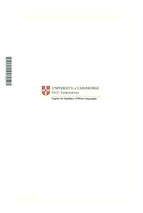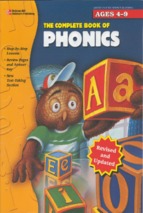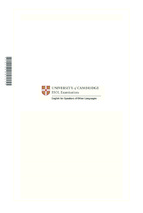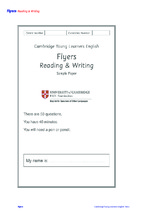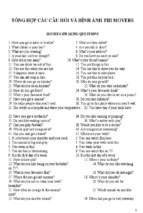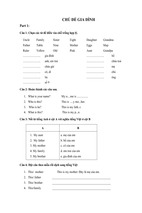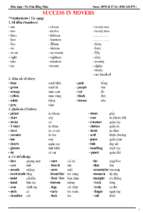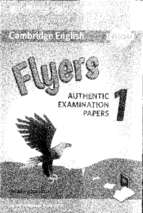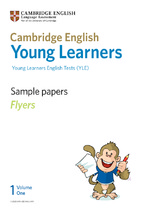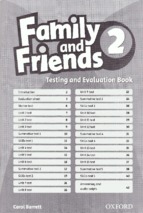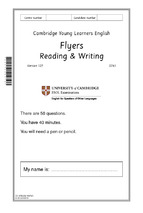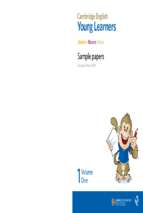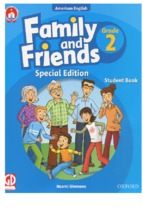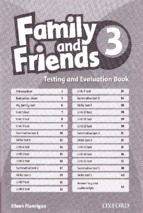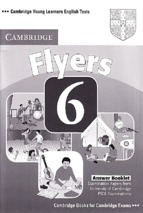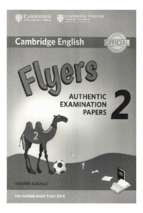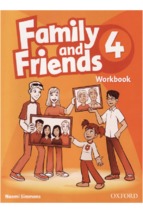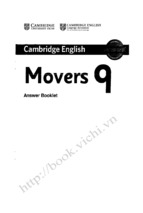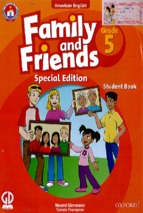~",,--..oLI-
•
•
•
•
•
•
•
•
•
•
grammar and vocabulary
1
2
3
4
5
7
8
9
12
13
3
Present Simple vs Present Progressive ••••••••••••••••••••••••••••••••••••••••••••••••••••••••••••••••••••••••••••••••••••••••••••••••••••••••••••• 6
Some / Any / No / Every and their Compounds •••••••••••••••••••••••••••••••••••••••••••••••••••••••••••••••••••••••••••••••••••••••••••• 9
Quantifiers ................................................................................................................................•.................................. 1:!
Future 'going to' ........................................................................................................................................................ 1~
•
...? / Why don't we •••? ........................................................................................................ 18
Smart Time 1 •••••••••••••••••••••••••••••••••••••••••••••••••••••••••••••••••••••••••••••••••••••••••••••••••••••••••••••••••••••••••••••••••••••••••••••••••••••••••••••• :!c:»
•••••••••••••••••••••••••••••••••••••••••••••••.••••.•••••••••••••••••••••••••••••••••••••••••••••••••••••••••••••• :!:!
Revision 1
Smart Skills 1 (Reading & Writing) ................................................................................................................... :l~
....~.,~~.,~~.,~~.,~ ..........•..•.•.....•.••...•.........•..............•..•..•....•.••..•.........................................•... :l8
Past Progressive .......•.................................••......•••..•.••.••.••.••....•..•..•...........•.•.•••.•.•••.•.••.••.•.••.•......•......•....•............•.•. 31
Past Progressive vs Past Simple ..•.••.•...........•.......•........•.......•..••.•...........•....•.........•.•.......•......••.....•.......•...•.•...... 33
Adverbs of manner - The verb 'could ............................................................................................................... 35
Personal pronouns - Possessive adjectives/pronouns ..••.••.••••.•••••.••••.••.•.....•..••.•.•••••.••••.••••••••.••••••••.••.•...... 38
Present Simple
•
s
•••••••••••••••••••••••••••••••••••••••••••••••••••••••••••••••••••••••••••••••••••••••••••••••••••••••••••••••••••••••••••••••••••••••••••••••••••••••••••
'not) as •.. os
.................................................................................................................................. ~1
•••••••••••••••••••••••••••••••••••••••••••••••••••••••••••••••••••••••••••••••••••••••••••••••••••••••••••••••••••••••••••••••••••••••••••••••••••••••••• 44
16
Smart Time 2
17
18
Revision 2
.....................................................................•..................................... ~~
Smart Skills 2 (Listening & Speaking)
........................................................................................................... ~8
.•.....••••.•.••.••.••....•..•..•..•...•.....................•..•.....................•................••.. ~~
...................••.••••••••••.......••••••••••••..•..•••••••••.....•.••.••..•........•..•..•..........•........................•.........•..•••••.•. ~~
20
The verb 'should'
2
Prepositions of movement •..••.••..•...........••...••.•..•......•..••.............•..........................•.••.•..•..........•.................••..••..... 56
22
i=lJtlJr'e ''l\fill' •••..•.•..•....•.•....•..•..•••.•••.•••••.•........•..•..•.•.........••..•.............•...........•......................•................................••..... 58
23
Can I/you•..?, Could I/you•..?, May I...? ............................................................................................................... 60
• •
25
26
27
tences Type 1 ............................................................................................................................... 6~
Smart Time 3
.................................................•..•..........•........•......•...........•...................................................•.....•.•... 66
....................................................................................................................... 68
Revision 3
Smart Skills 3 (Reading & Writing)
................................................................................................................. ~c:»
....•..•••••.•.....•••••••................................•........•........•...•••••••..••.................••••. ~~
29
Inifini1tive •..••.•...•....................••••.•...•.•.•••..••••••......•......•.••.••.......•.....•....••.•.••..•..•........•.......•.••.••.••••...•.•..•..•..•......••..•....•... ~6
30
-ing form
31
too / enough
32
Reported Speech (commands '- requests)
34
35
Smart Time 4
Revision 4
••••.••••••••••••••..•••••••••••••••••••••••••••••••••••••••••••••••••••••••••••••••••••••••••••••••••••••••• ~t:)
36
Smart Skills 4 (Listening & Speaking)
......................................................•..................................................... ~~
Grammar Reference
............................................................................................................ ~6
...................................................................................................................................................................... ~8
••••••••••••••••••••••••••••••••••••••••••••••••••••••••••••••••••••••••••••••••••••••••••••••••••••••••••••••••••••••••••••••••••••••••••••••••••••••••••••••• 81
83
Simple (affirmative) ................................................................................................................. 86
•••••••••••••••••••••••••••••••••••••••••••••••••••••••••••••••••••••••••••••••••••••••••••••••••••••••
........................................................................................................................................................... 88
,
present SimPle
W
e phrases with the pictures 1-5. Then, listen
Read the poster and m
and check your answer
G
Hi! I'm Gary and I go
to Sutton
Youth Club with my
best friend, Sam, on
Saturdays.
I usually have
drama lessons and he
plays chess. Then , we
go bowling together.
,
It's great here!
\
• Have an art class!
• Join the drama club!
• Go bowling!
• Play chess!
a
ti n
When does Gar~ go to the ~outh club?
3 What does Gar~'s friend do at the ~outh club ?
2 Does Gar~ have an art lesson?
If
4 What do Gar~ and his friend do together?
)
Present Simple
I\,
Prepositions of time
We use the Present Simple:
• for actions and habits that happen regularly.
e.g. Sandra plays the guitar every afternoon.
• for permanent situations.
e.g. My father works in the city centre.
•
at six o'clock / at half past two, etc.
at noon / at night / at midnight / at the weekend
in the morning / afternoon / evening, etc.
Adverbs of frequency go:
• before the main verb .
e.g. Peter usually has an
art class on Fridays.
• after the verb be.
e.g. Tina is always late
for school.
never
sometimes
often
usually
always
in May / in the summer, etc.
•
in my free time
Ii
on Monday / on Friday morning / afternoon, etc.
on weekdays
3
Lesson
~ Circle the correct words.
Does Oliver alwa~s play / plays chess on Tuesda~s?
2 John and Fiona doesn't / don't have drama lessons at the weekend.
3 Dan never go / goes to the ~outh club in the morning .
4 M~ siste r doesn't paint / paints pictures in the evenings.
5 Do Lee and Josh often watch / watches TV after dinner?
6 I wear / wears a scarf to school ever~ da~ .
W
Put the adverbs of frequency in the correct place. Draw arrows, as in the example.
•o
,
/"""'
usually
always
often
He takes the dog for a walk at 7 pm .
2 It's cold in Januar~ .
3 Helen
late for work.
never
sometimes
4 David and Sue have fish for dinner on Frida~.
~
IS
Complete with the Present Simple
5 The~ go bowling at the weekend .
the verbs in brackets.
Ian
Whe re's Paul?
Sam
Ian
He's at the ~outh club .
(1)
Sam
Yes, he usuall~ (2) _ _ _ _ _ _ (pla~) basketball there on Frida~ evenings.
Ian
What's it like there?
Sam
It's great. You can pla~ sports, learn to pla~ musical instruments .. .
Ian
(3)
Sam
Of course. But the~ (4) _ _ __ _ _ (not have) drama lessons .
Ian
That' s OK. I (5)
Sam
So, (6)
Ian
Yes, I do . It sounds Like fun!
4
he alwa~s _ _ _ _ _ _ (go) there on Frida~s?
the~
(have) art lessons there?
(not Like) drama reall~.
~ou
(want) to join, then?
~sson
~ Complete wi
in at
0
1
on
The restaurant closes _ _ _ _ _ _ midnight.
2 We have an art class
Wednesday afternoon .
3 Kelly and Paul don 't play board games _ _ _ _ _ weekdays.
4 When we are on holiday, we often swim in the pool _ _ _ _ _ _ the morning .
S What's on TV
ten o'clock tonight?
my free time, I enjoy playing the guitar.
6
7 My grandparents often visit us _ _ _ _ _ _ the weekend and we have lunch together.
-9?
Complete th t
e below with the things you usually do. Then, discuss.
On Monday ...
On Tuesday ...
On Wednesday ...
On Thursday ...
On Friday ...
At the weekend ...
On Monday, , usually go to the park with my friends. What about you?
5
present SitnPle vs present progressive
o
listen, read and match with the picture
a
®
Geoff is a chef and he makes
interesting cakes and sweets.
In this picture, he's making a
chocolate train .
b
Daniel is a dentist. In this picture,
he's fixing a girl's teeth .
e
Ken is a photographer. He works for
a newspaper and he loves his job.
d
Stephanie is a secretary and in this
picture, she's writing an e-mail.
e
Karen is a mechanic. In this picture,
she's fixing a car.
f
Fay is an artist. She usually paints
pictures of the sea .
r
Present Simple vs Present Progressive
The Present Simple is used:
• for actions we do every day or actions which are repeated regularly.
e.g. I send e-mails to my friends every week.
• for permanent situations.
e.g. My father works in a hospital.
Time Expressions
every morning / day / week / year etc.
on Monday / Tuesday / Friday afternoon etc.
in the morning / afternoon / evening
in January / February etc.
in the summer / winter etc.
at 7:00 / night / the weekend etc.
always / usually / often / sometimes / never, etc.
6
The Present Progressive is used:
• for actions that are happening now, at the moment
of speaking.
e.g. Janet is feeding her cat at the moment.
Time Expressions
now, at the moment
l,-
Stative Verbs
The verbs like, love, hate, want are not used in the
Present Progressive.
e.g. My sister is eating chocolate. She loves sweets.
---"esson 2
~
Read, look and complete. Use the Present Progressive.
( not! s_le_e-,-p_ _d_o___
ta_ke
listen
cook
play )
1 Bruce What _ _ _ _ _ _ _ _ the children _ _ _ _ _ _ __
in their room?
Karen They _ _ _ _ _ _ _ _ to music.
2 Robbie _ _ _ _ _ _ _ _ again . He wants to become a chef.
3 It's 11 o'clock at night, but Amanda _ _ _ _ _ _ __
She
computer games.
4 Look! The photographer
-1?
Choo
a
a photo of our school.
b.
Do you always _ _ _ _ _ _ _ _ _ _ _ _ your teeth before you go to bed?
b brush
a brushing
2 Kathy _ _ _ _ _ _--'--_ _ _ _ _ her dog for a walk at the moment.
b takes
a is taking
3
_ _ _ _ _ _ _ _ _ _ _-,,-.,_walking to school every day.
b am hating
a hate
4 The mechanic _ _ _ _ _ _ _ _ _ _ _ _ in the garden now. He's fixing the car.
b isn't sitting
a doesn't sit
5 - - - - - - - - - - - - on the board at the moment?
a Does the teacher write
b Is the teacher writing
6 Helen _ _ _ _ _ _ _ _ _ _ _ _ to become an artist.
a wants
b is wanting
7 Jack _ _ _ _ _ _ _ _ _ _ _ _ chocolate .
a doesn't like
b isn't liking
7
Lesso
. e what the peopl~ usually do
doing now
in the example.
visit her friends / travel to Oxford
Saturday morning and what the are
2 clean his room / write e-mails
Sandlj usuallu visits her friends on
Henrlj _ _ _ _ _ _ _ _ _ __
Saturday mornin g but she is travelling
~o
Oxford now.
4 plalj basketball/ride her bike
3 go shoppin g / go to the dentist
Eliza bet h _ _ _ _ _ _ _ _ _ __
~~(> Complete with the Present Simple 0
Vicklj
the Present Progressive
Tom is a farmer and he's got lots of work to do everlj dalj.
He (1)
(get up) at 5 o'clock everlj
morning and (2)
Then, he (3)
(have) a big breakfast.
(feed) all the animals on the
farm .
At the moment, Tom (4) _ _ _ _ _ _ _ _ _ (not do) anlj
work . He's in his bedroom. He (5)
pljjamas and he (6)
Tom (7)
(wear) his
(read) a newspaper.
(love) living on the farm, but
e 8 ) _ _ _ _ _ _ _ _ _ (not like) getting up earllj in the
8
Some I Any I No I Every and their Compounds
~ Look and complete.
LA....;
phone
check your answers.
player
control
1 MP3 _ _ __
3 digital _ _ __
-1-:11.'7
~
0
camera
:ten and
player
Say which gadgets you
have got.
)
2 DVD _ _ __
4 mobile _ _ __
5 remote _ _ __
Listen and read. What do the words in black mean? Discus
I want a mobile phone
with a camera.
W
We've got some great
mobile phones here and
every mobile phone has
got a camera.
0'
Excuse me, have you
got any DVDs?
No. There are
no DVDs in
this shop.
9
Lesson
r
J
Some / An / No / Every
We use some:
• with plural countable nouns and with
uncountable nouns.
• in affirmative sentences.
e.g. There are some great computer
games in this shop.
• in questions when we offer something politely.
e.g. Would you like some cake?
We use any:
• with plural countable nouns and with
uncountable nouns.
• in questions.
e.g. Have you got any mobile phones?
• in negative sentences.
e.g. I haven't got any DVDs.
We use no (not any) :
• with plural countable nouns and with uncountable
nouns.
• in affirmative sentences to give a negative meaning .
e.g. There is no (not any) milk in the fridge.
We use every:
• with singular countable nouns.
e.g. Every family in this town has got a car.
c rr d
e
_ -:~ :
ords.
every
e ' chen. Yuck!
,..,,.,~ 1
r=~::= :::-:~:_ ':" E :~ e 'e
some / any in this shop?
'-'a:.·c . I now you don't eat meat.
- tares.
-
- So
any ,-.e . .
-: ;;:: no
e E el1d :::~:::E"":"
-=~E S no
I.... S
.J
Class has got a mobi le phone .
any ':LJrn ~ ure in th e living room. My dad's going to paint it.
ComDounds
r
some, any, no
some
any
no
every
People
someone
somebody
anyone
anybody
no one
nobody
everyone
everybody
Things
something
anything
nothing
everything
Places
somewhere
anywhere
nowhere
everywhere
~
every
• These compounds always go with
singular verbs.
e.g. Someone is in the house.
• These compounds are used in the same
way as some, any, no and every, but they
are not followed by a noun .
e.g. I can't find my MP3 player anywhere.
Look and circle.
1 There's someone / no one in the street.
2 Someone / Everyone is waiting for the train .
3 Everyone / Anyone is running across the bridge.
4 No one / Someone is in the stadium.
5 Is anyone / someone in the cinema?
4
3
10
5
-------
~
Read and match.
What did ~ou see?
someone
2 Where did ~ou find it?
somewhere
3 Who is on the phone?
something
4 Where did Fred go on holida~?
nobod~
5 Who saw the film?
nothing
6 What did ~ou take a picture of?
nowhere
~~--------------
':9?
Choo
a b or c
Jonathan goes _ _ _ _ _ _ _ with his MP3
a ever~where
b an~where
2 The students didn't take
an~
pla~er .
He loves music.
c somewhere
photos on their trip because _____________
had a camera.
a
ever~one
b someone
3 Let's go _ _ _ _ _ _ _
a an~where
reall~
c no one
nice this weekend .
c ever~where
b somewhere
4 Is there - - - - - - - in the bathroom?
a an~where
5 There's
no b od ~
a Ever~thing
b no one
c
an~one
in t he house. _ _ _ _ _ _ _ is outside, in th e garden.
b Ever~bod~
c Someone
6 There's _ _ _ _ _ _ _ in the fridge. What are we going to eat?
a nowhere
~
b an~thing
c nothing
Complete the dialogue with the words in the box.
(
nobod~
an~where
an~thing
ever~thing
Marie Do ~ou want (1) _ _ _ _ _ _ _ _ from the supermarket?
Larry
No, but I need a new DVD pla~er .
Marie You can get one at the supermarket.
Larry
What? (2)
bu~s DVD p l a~ers from the supermarket.
Marie You're wrong. The~'ve got (3) _ _ _ _ _ _ _ _ there. Digital cameras, clothes ...
You don't need to go (4)
else to shop.
11
esson 3
~
Read and match.
What did you see?
someone
2 Where did you find it?
somewhere
-----
3 Wh o is on the phone?
--
l
som et hin g
)
4 Where did Fred go on holiday?
nobod y
5 Who saw the film?
nothing
6 What did you take a picture of?
nowhere
~ChOO
a b
J
.
c
Jonathan goes _ _ _ _ _ _ _ with his M P3 player. He loves music.
c somewhere
a everywhere
2 The students didn't take any photos on their trip because _ _ _ _ _ __
had a cam era .
a everyone
b someone
c no one
3 Let's go _ _ _ _ _ _ _ really nice this weekend.
a anywhere
b somewhere
c everywhere
4 Is there _ _ _ _ _ _ _ in the bathroom?
a anywhere
b no one
c anyone
5 There's nobody in the house. _ _ _ _ _ _ _ is outside, in the garden .
a Everything
b Everybody
c Someone
6 There's _ _ _ _ _ _ _ in the fridge. What are we going to eat?
a nowhere
~
b anything
c nothing
Complete the dialogue with the words in the box.
( nobody
anywhere
anything
everyth ing
Marie Do you w ant (1) _ _ _ _ _ _ _ _ from the supermarket?
Larry
No, but I need a new DVD player.
Marie You can get one at the supermarket.
Larry
What? (2)
buys DVD players from the supermarket.
Marie You're wrong. They've got (3) _ _ _ _ _ _ _ _ t here . Digital cam eras, clothes ...
You don't need to go (4)
else to shop .
11
Quantifiers
~ Put the words under the correct heading. Then, listen and check your answers.
tea
kiwifru it
drinks
~
peach
onion
coffee
beef
~
~ meat
Look at the picture. Listen
Which description is wrong
lamb
sausage
lettuce
lemonade
grapes
vegetables
d the two descriptions below.
®
a
There are tots of
sausages on
the tabte but th
ere aren't man
steaks. There '
!d
there
.
IS
IS
a titHe
Some coffee and
I
lemonade.
b There are a lot of sausages on
the table but there are onl~ a
few steaks . There isn't much
lemonade and there isn't an~
coffee .
12
0
Quantifiers (much, many, a lot of, lots of, a few, a little)
We use much with uncountable nouns in questions
and in negative sentences.
e.g. There isn't much cheese in the fridge. Let's get
some.
We use a lot of and lots of with
uncountable and plural countable nouns,
usually in affirmative sentences.
e.g. There are a lot of sausages on the table.
There's a lot of spaghetti on the plate.
~
Complete with a few
We use many with plural countable nouns, usually in
questions and in negative sentences.
e.g. Are there many students in the classroom?
We use a few with plural countable
nouns in affirmative sentences.
We use a little with uncountable
nouns in affirmative sentences.
e.g. There are a few oranges in the
fridge.
e.g. I've got a little meat. Let's
make a meat pie.
a little
Neal Nice idea. I'd like (5)
Neal I'm hungry .
Elsa
Me too . What's in the fridge?
Neal There are (1)
and there is (2)
Elsa
crisps with mine .
sausages
cheese .
Have we got any tomatoes?
Neal Yes, we've got (3)
Elsa
Elsa
cupboard .
Neal Great. Would you like some orange juice?
Elsa
No, thanks. Have we got lemonade?
tomatoes.
Neal No. We haven't got any .
OK, let's make (4)
Elsa
OK . I'll just have (6)
water, then .
sandwiches .
i?
Me too . I think there are some in the
look, read and tick (V) the correct sentence.
There aren't many grapes in the bowl.
There are lots of grapes in the bowl.
3 There is a lot of sugar in the tea .
There is a little sugar in the tea .
2 There isn't much lemonade in the bottle.
There is a lot of lemonade in the bottle .
4 There are a lot of beans in the bag .
There are a few beans in the bag .
13
Lesson
~Ci
Ie the correct word .
I don't like pizza with a lot of / a few cheese on it.
2 It was a boring party because there weren't much / many people there.
3 I'd like a little / much salt on my salad .
4 Let's visit your cousin for a few / a little days .
5 There isn't many / much orange juice in this carton .
6 There are lots of / lot of peaches on the tree.
7 How much / many onions do you need for this recipe?
~b
hoose a b
c
There aren 't _ _ _ _ _ _ _ grapes left. Let's go to the supermarket and get some .
a many
b much
c a little
2 I only want _ _ _ _ _ _ _ beef. I don't really like it.
a much
b a little
c a few
3 Can you get me ________ sausages from the fridge?
a much
. b a few
c a little
4 We haven't got ________ lamb . We need about two kilos and we've only got one.
a much
b a little
clots
5 There aren't _ _ _ _ _ _ _ seashells on this beach .
a many
b a lot
c much
6 I'd like _ _ _ _ _ _ _ milk in my coffee, please.
a much
~JJ
b a few
c a lot of
What are your eating habits? Play the game and tell your partner.
~ lot
of lettuce.
)
, don't eat many vegetables.
14
future 'going to'
~
'--"-.1
listen and complete the survey below. Then, discuss it with your partner ( Q' ,
~
1 Where are you going to go next summer?
2 Where are you going to stay?
o
hotel
o
campsite
o
friend's house
o
caravan
3 Who are you going to go with?
o
parents
o
cousins
o
friends
o
swim
o
sunbathe .
o
classmates
4 What are you going to do there?
•
••
•
••
•
••
••
•
o
go hiking
o
o
do water
sports
play beach
volleyball
We use the Future 'going to':
• for plans and actions that we intend to do in the future.
e.g. I'm going to travel to Spain next summer.
•
for predictions based on evidence.
e.g. Look at those clouds! It's going to rain.
o
o
go sightseeing
go rock
climbing
Time Expressions
tomorrow / tonight
next month/year/week/Tuesday, etc.
this weekend/week/month, etc.
in an hour/a year, etc.
soon
15
Lessor
~
LA:.;
Complete with the Futu
send
stay
going to
not sunbathe
the verbs in the box.
not swim
do
not travel )
1 Mary _ _ _ _ _ _ _ _ at a hotel near the beach next weekend.
2 _ _ _ _ _ _ _ _ you _ _ _ _ _ _ _ _ Bob an e-mail tomorrow?
3 I _ _ _ _ _ _ _ _ to Brazil next summer. I haven't got any money.
4 Kathy and Beth _ _ _ _ _ _ _ _ . They hate sitting in the sun.
5 We _ _ _ _ _ _ _ _ in the pool. It's cold .
6 Mike _ _ _ _ _ _ _ _ lots of water sports when he goes on holiday. He just loves the sea .
~
Look at the pictures a
the prompts below and write sentences with the Futu
1 Tony / play / football
Tonl,J isn't going to plal,J football.
He's going to plal,J basketball
2 Mr Jones / buy / car
3 Mr and Mrs Felix / crash into / wall
4 Kelly / go rock climbing
16
going to
-,essen 5
~ Read Lyn's plans for her holiday and answer the questions, as in the example.
A..j
My holiday
Monday
Tuesday
Wednesday
Thursday
Friday
Saturday
Sunday
go hiking
meet my cousins
go sightseeing
have lunch at a local restaurant
do water sports
buy souvenirs
travel back home
Is she going to meet her cousins on Monda\:j?
No she Isn't. She's gOing to go hiking
2 What is she going to do on Thursda\:j?
3 What is she going to do on Saturda\:j?
Is she going to go sightseeing on Sunda\:j?
:::>
What is she going to do on Tuesda\:j?
6 Is she going to bU\:j souvenirs on Frida\:j?
~ Write three sentences about wh
you are going to do
nd wha you aren't going to do
next weekend.
1 ____________________________________________________________~___
2 _________________________________________________________________
3 _________________________________________________________________
17
~
Let's ... I How aboUt ... ? I WhY don't we ... ?- -
W
look and match. Then, listen and check your answer
®
a a quiz show
b the news
c the weather forecast
d a wildlife documentar~
e a realit~ show
3
f a sports programme
9 a cartoon
6
1?
7
look at the TV programmes in activity 1. What do you think of them? Use the
adjectives below.
C nterestin g
fun
~
boring
awful
sill~
exciting
funn~
Read and listen. Which programme do they decide to watd
,,,
j
-
®
Tanya
How about watching TV?
Melissa
OK. What's on?
Tanya
There 's a sports programme on Channel 5.
Melissa
No, that's boring. Wh~ don't we watch a
I~
documentar~
Tanya
about tigers?
I don't know ... He~! There's a quiz show on
Channel 2. Let's watch that.
Melissa
That's not exciting!
Tanya
OK. A wildlife documentar~ then .
• We use let's + verb and Why don't we + verb? to
suggest something :
e.g. Let's watch a cartoon.
I'm bored. Why don 't we watch TV?
18
• We also use How about + verb-ing? to suggest
something :
e.g. How about watching that new reality show?
-Jesson 6
m
How about playing football today?
a Let's watch it!
2 My car doesn't work.
b No, it's raining .
3 Why don't we buy some new clothes?
c No thanks. I'm not hungry .
4 There's a sports programme on TV.
d Yes, let's go to the shopping centre.
5 Let's get some hamburgers .
e Let's take it to the mechanic.
6 I want to watch TV.
f Why? What's on?
5? Look at the pictures and make suggestions using the prompts.
Alan
The news is really boring.
(watch / quiz show)
Will
Let's --------------------------------------
2 David It's raining today .
(play / computer games)
Jenny Why ______________________________________ ?
3 Philip Is it going to rain tomorrow?
(watch / weather forecast)
Jane
-
I don't know. Wh y ____________________________ ?
Diane Do you want to watch a wildlife documentary?
1J
(play / chess)
Frank No. How ___________________________________ ?
6]
Look at the TV guide and make su
estions.
How about watching
the new reality show?
No, reality shows
are boring . Let 's ...
5.00 Cartoon
7.00 The newS
8.00 The weather forecast
9.00
REALITY SHOW
7.00 Quiz show
8.00 Wildlife documentary
f-
9.00 Sports programme
lffAlI~CAA.
,,'i\lG~
_
- Xem thêm -

